The Presidential election is not the only historic race on the ballot on November 8th. Voters across the nation, from California to Maine, will be voting on whether or not to legalize marijuana. As the election nears, coverage of the possibility of more widespread legalization has been predictably offbeat – Legalization Means More Pets are Getting High – but there is widespread belief that the tide has turned on legalization. The Washington Post notes that 63% of Americans now support the legalization of marijuana, up from just 44% in 2014. In California, a state which rejected legalization in 2010, there is not a 17 point margin in favor of legalization.
But, there is an important distinction to be made between “legalization” and the passing of Propositions in various states. Many people might support legalization or decriminalization at the individual level, but disagree on the creation of taxable industries around the drug.
To find out how the public truly feels about this complicated topic, Unanimous AI partnered with Where’s Weed to form a Swarm Artificial Intelligence and asked the Swarm a number of questions about many aspects of marijuana legalization. Unlike polls, Swarm Intelligence compels groups to work together and build consensus around the answers that optimize conviction or confidence, and so it gives deep insights into how groups arrive at their answers.
First, the Unanimous AI researchers asked the Swarm whether or not alcohol regulation provides a good model for marijuana to follow. Each magnet you see below represents one person in a real-time negotiation.
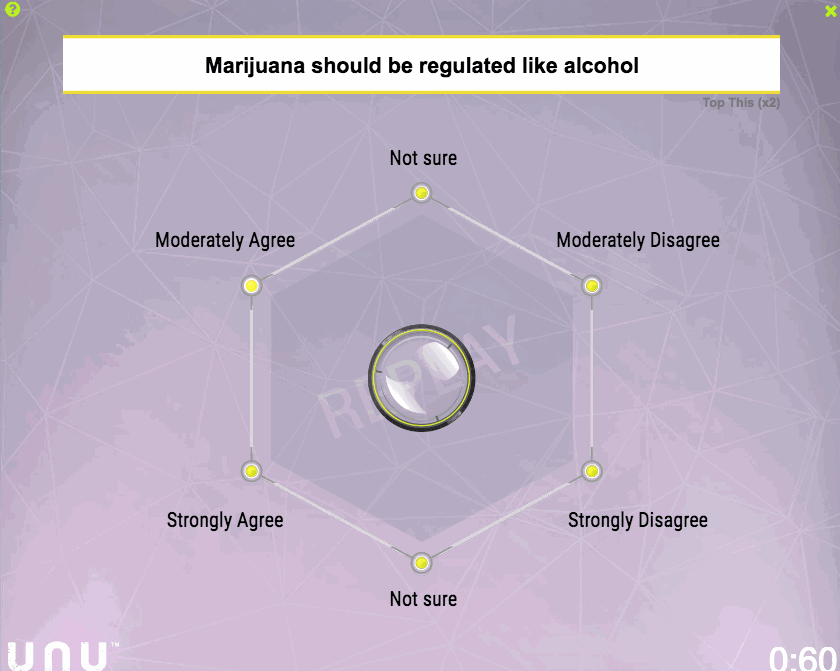
As you can see, the Swarm only “Moderately” agreed that Alcohol provides a good model for recreational marijuana. Of course, alcohol and marijuana are very different substances, with substantially different concerns around legalization. So, in trying to find the best model for more widespread legalization of marijuana, it might be wise to consider the various programs implemented in different parts of the US.
In Washington D.C., for example, weed is considered legal, but severe restrictions outlaw smoking in all public places, effectively stigmatizing and isolating smokers. In contrast ( and, perhaps in keeping with the mellow vibe associated with smokers ), Colorado’s policy is “discretion is appreciated, and usually required.” While some seemingly public venues like clubs and bars are considered “private” in Colorado, would-be smokers are essentially encouraged to read the mood and vibe of the room to determine whether or not smoking is acceptable. So, which region does the Swarm believe provides the best model for other states to follow?
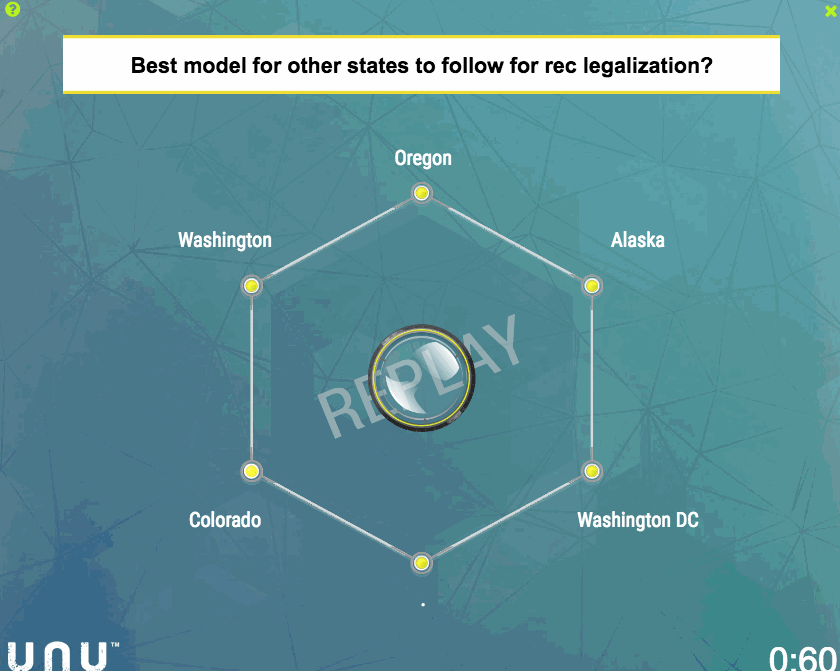
Looking more deeply into the result, we can see that disparate approaches taken by Colorado and Washington are the only two under consideration by the Swarm. The chart below shows that support for the Colorado model was always well-supported, with Washington DC the only other choice to receive legitimate support. But, as the decision evolved, and it became clear to the DC backers that their first-choice would not win, they quickly found consensus around Colorado as the next best option. So, while the Colorado model might not have been everyone’s first choice, it is easy to see that it is the choice that maximized the total satisfaction of the group.
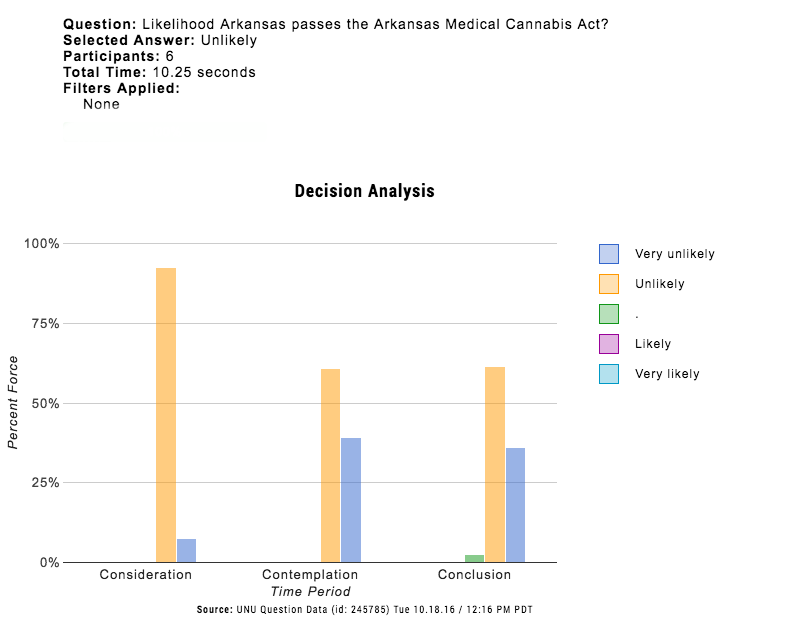
Of course, Colorado’s welcoming policy isn’t the only reason to use the state as a model. The state’s innovative dispensary industry became a billion dollar industry in 2015, up 42% from the year before and with no signs of slowing down in 2016. With so much money at stake, it’s no wonder that neighboring states are eager to pass their own Propositions for the legalization – and taxation – of the wildly popular drug.
With that in mind, the Unanimous A.I. researchers asked the Swarm to make a series of predictions about the likelihood of legalization passing on ballots across the country. First up is California, which again rejected a similar proposition in 2010.
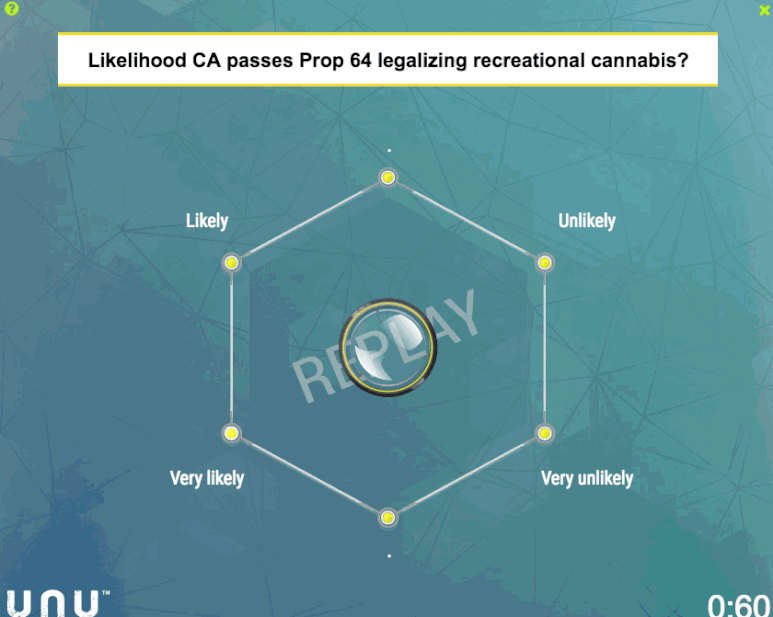
Here the Swarm clearly believes that California will reverse the course of its 2010 decision. In fact, California now seems poised to pass Prop 64 in a “landslide.” And that optimism is not confined to the West Coast. The Swarm shows the same confidence when asked to predict the likelihood of Prop Q1 passing in Maine on November 8th.
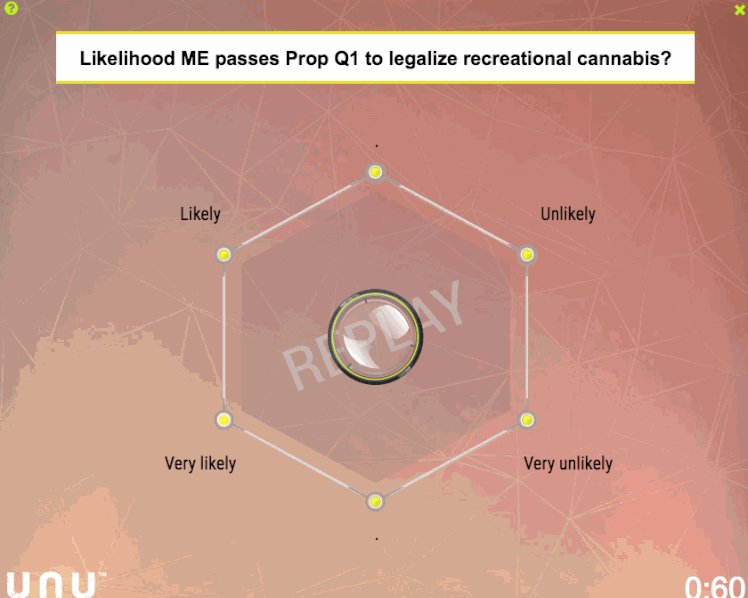
The Swarm also believed that Nevada was “Very Likely“ to pass legalization, an outcome that would certainly be in keeping with its permissive culture and progressive views. Many news organizations are reporting that legalization will pass in every state where it is on the ballot, but the Swarm is not so sure. Despite the bullish projections, the Swarm is very skeptical of legalization’s chances in some states, especially ones in the Bible Belt.
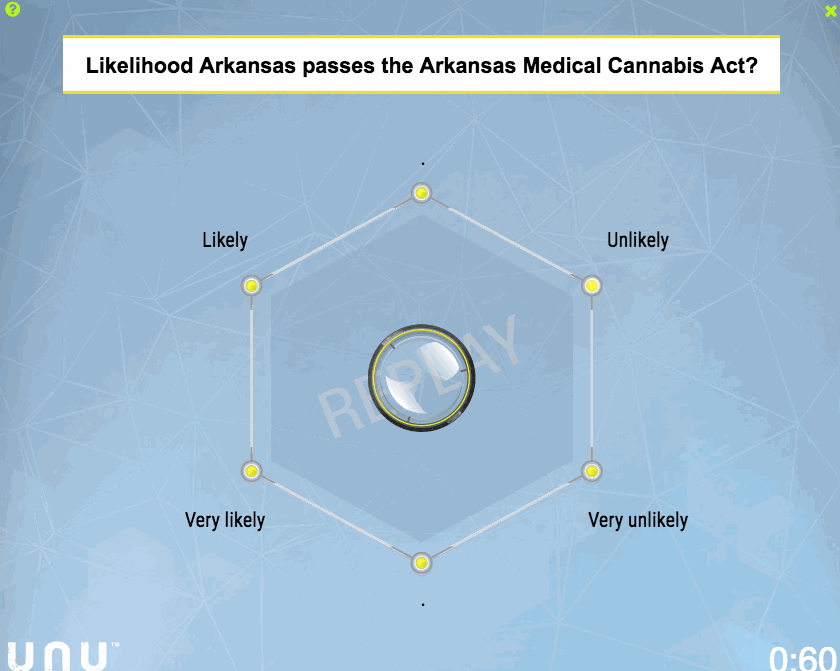
Not only did the Swarm reach its conclusion in a matter of seconds, as you can see in the chart below, the only options considered were “Unlikely” and “Very Unlikely.” Considering the fact that the Swarm was composed of people who likely lean progressive, the sort of skepticism seen here should give Arkansas marijuana activists reason to ramp up their efforts. After all, many people thought that California’s 2010 Proposition would be an easy way for legalization.
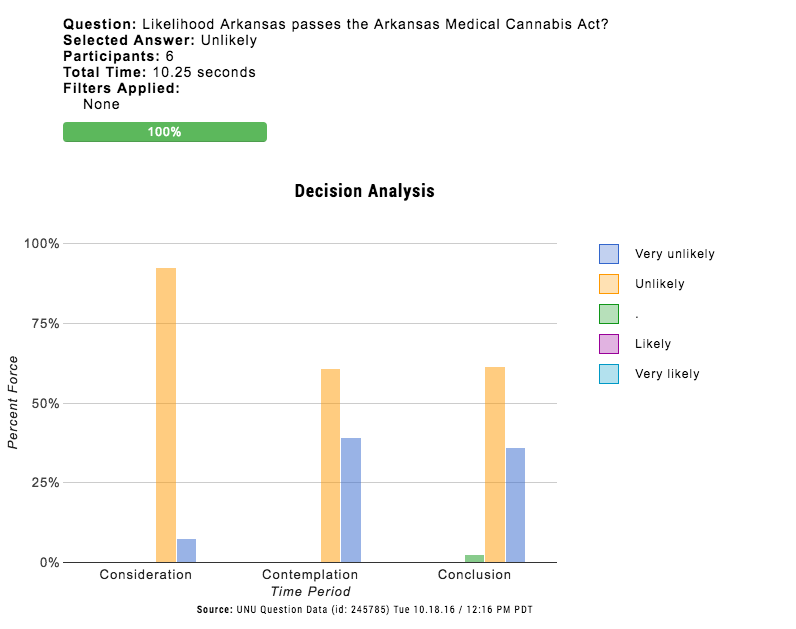
Unanimous A.I. researchers asked the Swarm to predict every single region where legalization is on the ballot. Here is the full rundown.
Likelihood that California passes Prop 64? Swarm says….Very Likely: REPLAY
Likelihood that Arizona passes 205? Swarm says….Likely: REPLAY
Likelihood that Maine Passes Prop Q1? Swarm says…Very Likely: REPLAY
Likelihood that Massachusetts passed Prop Q4? Swarm says….Likely: REPLAY
Likelihood that Nevada passes Prop Q2? Swarm says…Very Likely: REPLAY
Likelihood that Arkansas passes the AK Medical Cannibas Act? Swarm says….Unlikely: REPLAY
Likelihood that Florida passes Amendment 2? Swarm says…Unlikely: REPLAY
Likelihood that Montana passes Ballot Issue 24 (I-82)? Swarm says…Likely: REPLAY
Likelihood that North Dakota passes the North Dakota Compassionate Care Act? Swarm says….Very Unlikely: REPLAY
Likelihood that Ohio’s recreational marijuana bill is on the ballot in 2017? Swarm says…Unlikely: REPLAY
Ultimately, the Swarm seems slightly more skeptical than the media at large. That hesitance might simply be skepticism, or a reflection of the Swarm’s members’ deeper understanding of the issues at play in legalization. After all, in 1969, at the height of the hippy era, only 13% of people were in favor of legalization. While nationwide legalization seems like an eventuality, the Swarm seems to be saying, in short, these things take time. But how long?
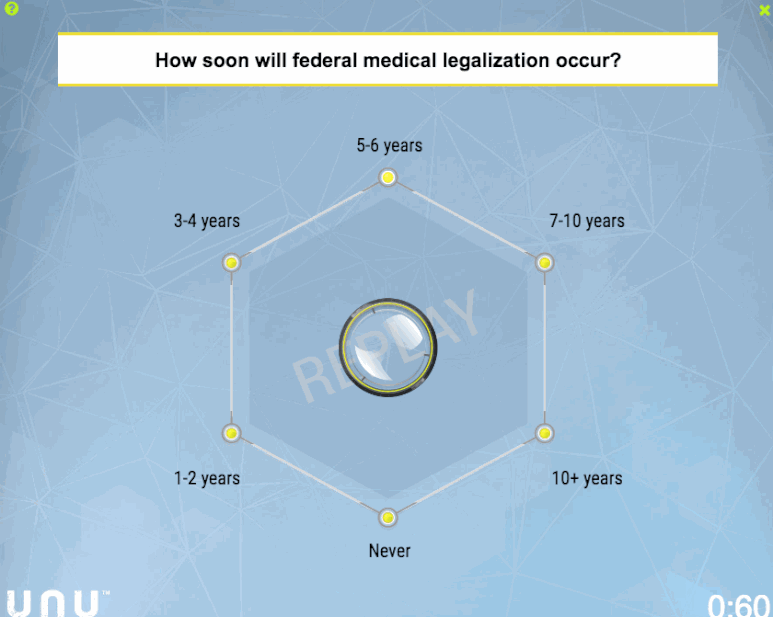
Do you have a topic that you’d like to see a Swarm Intelligence dig deep into? Drop me a line anytime.


